Benefits Of Aloe Vera For The Skin: These 5 Are Unexpected
If you’re seeking a natural solution for common skin issues, look no further than aloe vera. Known for its impressive medicinal properties, this powerful plant can effortlessly address various problems, ranging from dryness to inflammation.
Discover the numerous benefits aloe vera has to offer for your skin and why it might just become your next skincare staple.
Aloe vera is packed with vitamins, minerals, enzymes, and amino acids that help stimulate healthy cell growth and improve overall skin function.
This plant’s gentle, soothing nature makes it suitable for all skin types and particularly effective for sensitive or acne-prone skin. Say goodbye to redness and irritation, as aloe vera cools the skin while providing much-needed hydration.
Need extra convincing? Aloe vera has been used for centuries in traditional medicine thanks to its anti-inflammatory, antibacterial, and antioxidant properties.
By incorporating this amazing ingredient into your skincare routine, you’ll witness noticeable skin texture and appearance improvements. Don’t wait any longer – embrace the power of aloe vera and watch your skin flourish.
Benefits Of Aloe Vera For The Skin
You may have heard about the benefits of aloe vera for the skin but are looking for the details on this.
Or maybe, you want to know if the properties and potential benefits of aloe vera will work for your skin type too? No matter why you’re here, I’ll answer all your questions about aloe vera. Let’s dive in!
Common Names: Aloe.
Latin Names: Aloe vera, Aloe africana, Aloe arborescens, Aloe barbadensis.
Aloe vera is a succulent plant that belongs to the Liliaceae family and has spiny, fleshy leaves. It grows in many hot and dry regions worldwide. It is cultivated in subtropical regions worldwide, including the southern border areas of Texas, New Mexico, Arizona, and California [1].
The plant’s gel-like substance inside its leaves is known for its healing properties, making it a go-to remedy for sunburns, skin irritations, and other ailments.
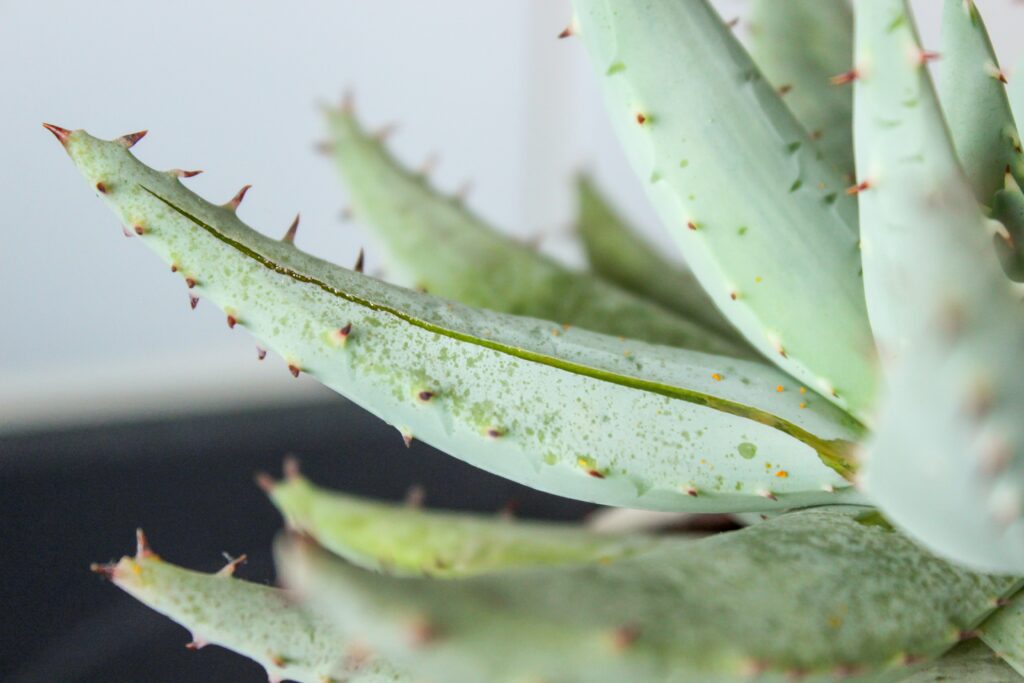
Natural Moisture For Your Skin
Aloe vera, celebrated for its numerous skin benefits, offers natural moisture that keeps your skin looking fresh and supple.
It’s not just about hydrating your skin, though; this magical plant has numerous properties that can do wonders for your skin’s overall health. Let’s dive straight into the remarkable benefits that aloe vera provides as a natural moisturizer.
One of the top advantages of using aloe vera as a moisturizer is that it doesn’t leave an oily residue on your skin. This characteristic makes it suitable for people with oily or combination skin.
It effectively locks in moisture without causing breakouts, enabling your skin to breathe as it hydrates.
In addition to being lightweight, aloe vera contains natural enzymes that help exfoliate your skin. Exfoliation removes dead skin cells, making your skin less dull and promoting a brighter complexion. The enzymes found in aloe vera include:
- Bromelain
- Papain
- Amylase
- Catalase
By offering gentle exfoliation, aloe vera helps to reveal a more radiant layer of skin, leaving your complexion looking fresh and revitalized.
Lastly, the natural moisture aloe vera offers makes your skin more elastic. As a powerful humectant, it maintains water balance in the skin and improves your skin’s elasticity.
This effect helps reduce the appearance of fine lines and wrinkles, leading to a more youthful and vibrant complexion.
Reduces Inflammation
Inflammation is a common skin concern, but aloe vera can help to reduce redness and soothe irritated skin. This section will discuss the anti-inflammatory properties of aloe vera and how it can be used to treat acne and calm sensitive skin.
Aloe vera has a calming effect on the skin, reducing redness and inflammation. Its anti-inflammatory properties make it an ideal ingredient for those with sensitive skin, helping to soothe and calm irritated skin.
Aloe vera’s anti-inflammatory properties also make it an effective acne treatment. Its antibacterial properties help to kill the bacteria that cause acne, while its hydrating properties help to soothe and calm inflamed skin.
Regular use of aloe vera can help to reduce the appearance of acne and prevent future breakouts.
Promotes Collagen Production
Collagen is a key component of youthful, radiant skin. This section will explain how aloe vera can help to promote collagen production and stimulate cell renewal, resulting in firmer, smoother, and more radiant skin.
Collagen is a protein that gives our skin its elasticity and firmness. As we age, our body’s natural collagen production decreases, leading to wrinkles and fine lines.
Aloe vera is rich in vitamins and minerals that help to promote collagen production, helping to keep our skin looking youthful and radiant.
Aloe vera also has cell-stimulating properties that help to promote cell renewal. This helps to keep the skin looking youthful and radiant by promoting the growth of new, healthy skin cells. The result is firmer, smoother, and more radiant skin.
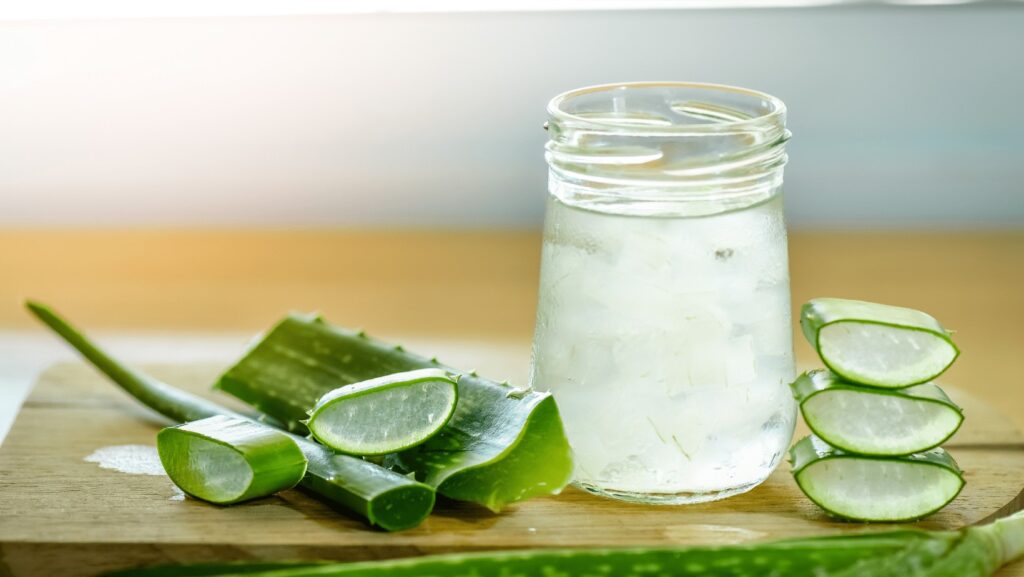
Brightens The Skin
A dull complexion can make us look tired and older than we feel. This section will examine how aloe vera’s antioxidants and skin-brightening properties can help rejuvenate and brighten the skin, leaving it youthful and radiant.
Aloe vera also proves to be a potent source of antioxidants. Loaded with essential vitamins and minerals, it successfully combats free radicals that damage your skin and contribute to premature aging. Some of the key antioxidants found in aloe vera are:
- Vitamin C
- Vitamin E
- Vitamin B12
- Folic acid
- Choline
These ingredients work together to protect your skin from environmental stressors while providing nourishment and promoting overall skin health.
Aloe vera is rich in antioxidants, which help to protect the skin from free radical damage. These free radicals can cause premature aging and dullness, so it’s important to protect your skin against them. Aloe vera’s antioxidants help brighten and rejuvenate the skin, leaving it radiant and refreshed.
Aloe vera also contains compounds that help to improve skin tone and texture. Its hydrating properties help plump the skin, while its antioxidants help protect against free radical damage. The result is brighter, more even-toned skin with a youthful glow.
Soothing Sunburn Relief
Aloe Vera is your go-to solution for sunburn relief. Its soothing properties help alleviate the discomfort associated with sunburn and speed up the healing process. Let’s dive into what makes Aloe Vera such an effective remedy and how to use it to ease your pain.
Aloe Vera contains over 75 active ingredients that work together to provide healing and soothing effects. Here are some of its most essential components:
- Vitamins A, C, and E: These antioxidants promote healthy skin regeneration.
- Enzymes: They help reduce inflammation and relieve pain.
- Minerals: Calcium, chromium, copper, selenium, magnesium, potassium, and zinc support proper skin function.
- Sugars: Polysaccharides provide hydration and skin repair.
The gel extracted from Aloe Vera leaves forms a protective barrier on the skin, locking in moisture while allowing it to breathe.
Applying Aloe Vera gel to sunburned skin promotes rapid healing, combats inflammation, and can help with itchiness or redness. Follow these steps to get the most out of your Aloe Vera sunburn treatment:
- Clean the affected area: Gently cleanse your sunburned skin with lukewarm water to remove any contaminants that could irritate it further.
- Apply the Aloe Vera gel: Gently pat the Aloe Vera gel onto your sunburned skin. Be sure not to rub, as it could cause further irritation.
- Repeat as needed: Reapply the Aloe Vera gel throughout the day to maintain moisture and continue soothing your skin.
It’s crucial to use pure, natural Aloe Vera gel to treat sunburns. Many store-bought products may contain inactive ingredients and additives.
To ensure you’re getting the real deal, look for products labeled as 99% or 100% Aloe Vera, or better yet, extract the gel straight from an Aloe Vera plant leaf.
Keep some Aloe Vera gel on hand during those sunny months, and you’ll be well-equipped to deal with any sunburns that come your way.
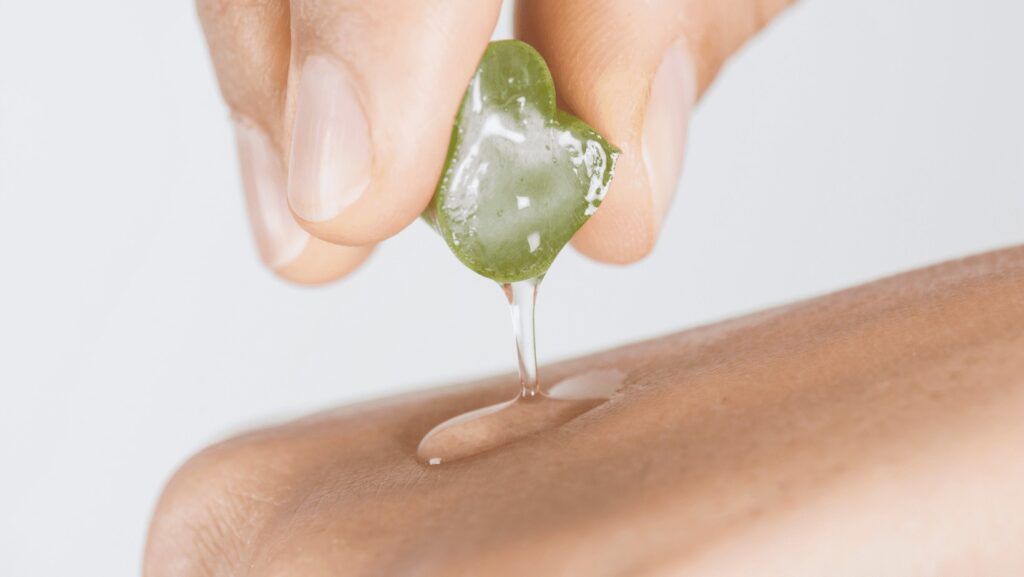
Potential Side Effects On The Skin When Using Aloe Vera
Aloe Vera is a natural remedy that has been used for centuries to heal and soothe skin. It can help reduce inflammation, redness, itchiness, and even scars from acne or other skin ailments.
However, if you are using aloe vera on your skin, it is also essential to be aware of the potential side effects. Some side effects of aloe vera on the face are increased sun sensitivity due to its photosensitizing properties and irritation and rashes in individuals with sensitive skin types.
Topical use of aloe gel is generally well tolerated. However, there have been occasional reports of burning, itching, and eczema with the topical use of aloe gel.
Does Aloe Vera Clog Pores?
To come straight to the point, aloe vera does not clog pores. This means that aloe vera is non-comedogenic. To rate this, there’s a comedogenic scale of 0–5. The higher the number is, the higher the chances are that your pores may get clogged.
Generally, values of 2 and below are unlikely to cause clogged pores. So products containing ingredients with these scores are considered non-comedogenic.
The comedogenic scale ranges from 0-5 and looks like this:
- 0: Does not clog pores
- 1: Low chance of clogging pores
- 2: Moderately low chance of clogging pores
- 3: Moderate chance of clogging pores
- 4: Relatively high chance of clogging pores
- 5: High chance of clogging pores
Aloe vera is rated a 0. This means that it just does not clog pores in any way, shape, or form.
Sources and Forms of Aloe Vera
Aloe vera, a succulent plant species of the genus Aloe, can be found in many forms. The most common sources are either the gel from inside its leaves or juice.
Additionally, aloe vera is also available as capsules and tablets; lotions, creams, and ointments for topical application; powder that you can add to smoothies; or whole-leaf extract in beverages.
No matter which form of aloe vera you choose, each one contains high concentrations of essential vitamins and minerals that can provide numerous health benefits.
How to Use Aloe Vera on Your Skin
Aloe vera is a natural remedy that has been used for centuries to soothe skin. It’s packed with vitamins and minerals, making it great for healing and repairing skin. You can opt for the most natural version of the application by getting it straight from the plant:
- To use aloe vera on your skin, cut off a piece of the plant, squeeze out some gel-like sap onto your palm, and then rub it into the affected area.
- Leave it on for at least 20 minutes before rinsing it off with warm water.
You can also purchase aloe vera products from stores if you don’t have access to an aloe plant. Here are some of my recommendations:
The Best Skincare Products With Aloe Vera
- Isntree Aloe Soothing Gel – 80% Aloe Vera
- Alpha-H Balancing Cleanser with Aloe Vera
- Bondi Sands Hydra After Sun Aloe Vera Cooling Foam
- Dr. Zenovia Aloe Vera Blemish Soothing Moisturizer
- Ceremonia Oil Mist Con Aloe Vera
- Dr. Barbara Sturm Aloe Vera Gel
- Sephora Collection Vitamin Face Masks
Getting The Most Out Of Aloe Vera Treatment
For the best results from your aloe vera treatment, make sure you use fresh aloe gel or juice (not store-bought). To get the most out of it, apply it directly to clean skin and massage gently into affected areas until absorbed. Do this once a day for two weeks – you should start seeing results in no time!
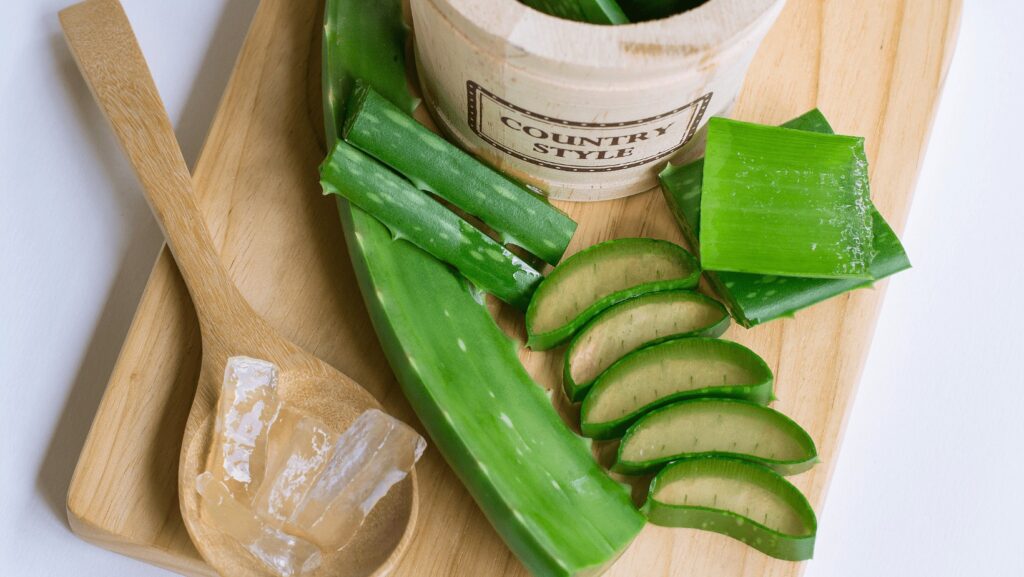
Alternatives To Using Aloe Vera On The Skin
Aloe vera isn’t the only miracle product, so if you’re looking for great alternatives, check out the following powerful remedies below:
- Coconut oil is one such alternative; it is a powerful anti-inflammatory agent and has been shown to reduce redness and inflammation when applied topically.
- Witch hazel extract is another option; it contains natural astringent properties which help tighten the skin and reduce irritation from sunburns or insect bites.
Conclusion On What Does Aloe Vera Do For The Skin
To conclude on “what does aloe vera do for your skin,” it’s the following: Aloe vera is a must-have ingredient in any skincare routine, from hydration and anti-inflammatory properties to promoting collagen production and brightening the skin.
Throughout this article, you’ve learned about the incredible benefits that aloe vera has for your skin. By now, it’s clear that this versatile plant is more than just a pretty succulent.
So to answer “how does aloe vera help your skin?” Aloe vera offers numerous advantages for skin health, including:
- Soothing irritation and calming redness
- Hydrating dry skin and locking in moisture
- Accelerating the healing process of wounds and burns
- Reducing the appearance of acne and minimizing acne scars
- Stimulating collagen production for more youthful-looking skin
It’s also noteworthy that aloe vera is gentle and suitable for use on various skin types. So, whether you have oily, sensitive, or dry skin, you can confidently apply aloe vera to help improve your skin’s overall appearance and health.
To reap the benefits of this wonder plant, make sure to opt for 100% pure aloe vera gel or products containing high concentrations of aloe.
Incorporating aloe vera into your skincare routine can be as simple as applying it directly onto your skin, or you can mix it with other natural ingredients to create DIY face masks or lotions. With consistent use, you’ll likely notice improvements in your skin’s texture, radiance, and overall health.
Frequently Asked Questions
article sources
- National Center For Complementary And Integrative Health. Aloe Vera. August 2020.


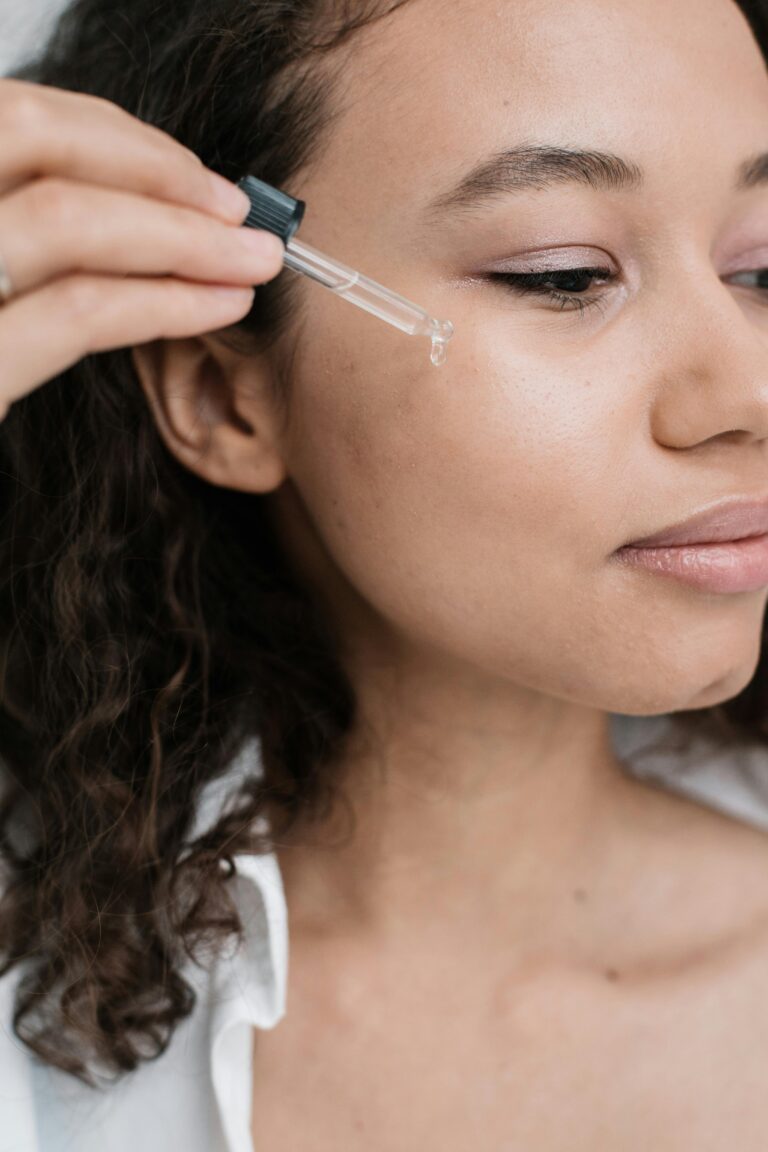
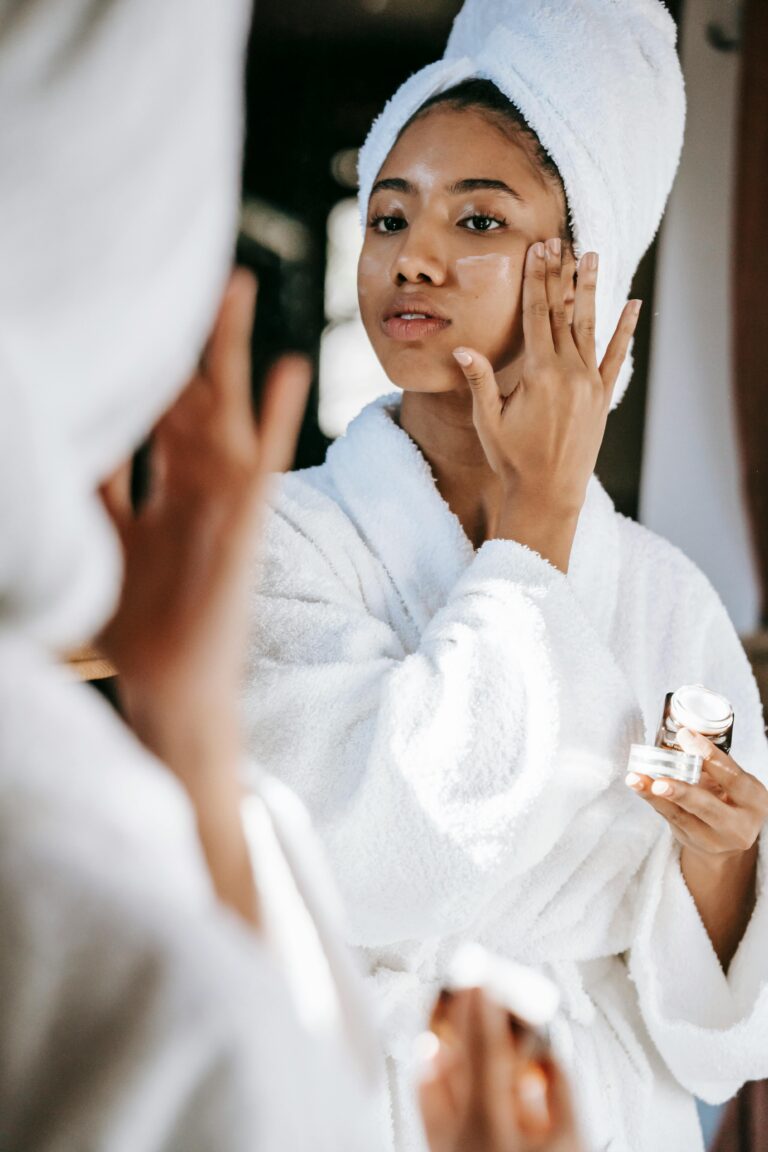
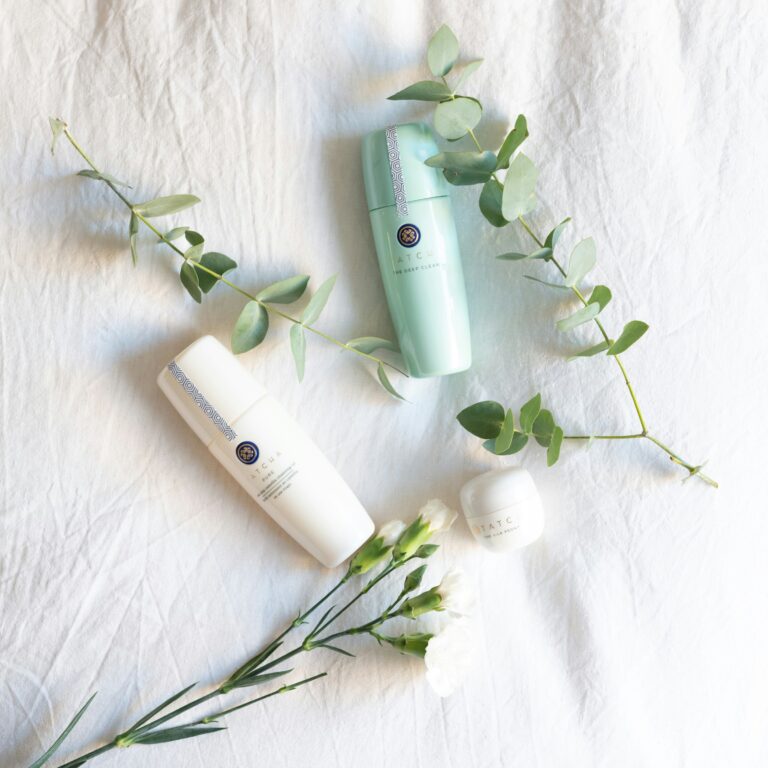

4 Comments